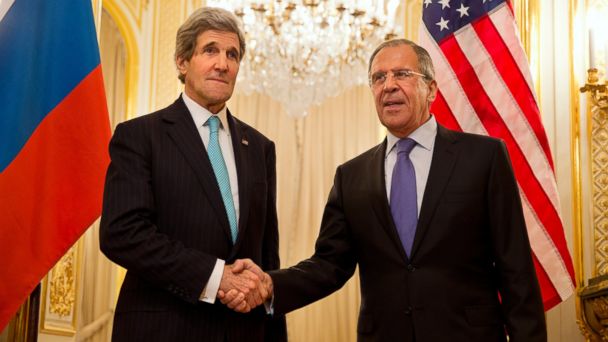What To Expect From Thursday's Russia/Ukraine Talks (Spoiler: Not Much)

(Photo Credit: Jacquelyn Martin/AP Photo)
Secretary of State John Kerry and his Russian counterpart, Sergey Lavrov, have already spent at least 10 hours together in the past month, not to mention almost daily phone calls, trying to find a diplomatic solution to the Russian incursion in Ukraine.
During that period, the region of Crimea has essentially been lost to Russia and pro-Russian militants have spread throughout the eastern part of the country, with little meaningful resistance from the Ukrainians.
So what good can come from one more set of meetings Thursday in Geneva, Switzerland?
First and foremost, officials say, it's the first time Russians and Ukrainians will sit together along with the United States and European Union since anti-Russian protests began in Kiev in February.
"The idea here is to try to provide a space where the U.S. and the E.U. can squat with Russia and Ukraine and look first and foremost for ways to de-escalate the security situation which has gotten significantly more perilous over the last ten days," a senior State Department official told reporters during Kerry's flight to Geneva.
The Ukrainians have some concrete ideas for de-escalation, the official said, including amnesty to anyone who lays down their weapons and the setup of formal negotiating forums. And the United States will offer additional proposals Thursday, the official said, without elaborating.
But experts inside and outside the government are keeping expectations for the talks low, given that Russia has shown no signs of backing off its claim that it's getting involved in Ukraine simply to defend a pro-Russian minority.
"We're going to have these conversations, but I wouldn't look at this as the end-all, be-all necessarily," State Department deputy spokesperson Marie Harf said today.
It's more about the optics of Lavrov and Ukrainian Foreign Minister Andreii Deschytsia's meeting together along with Kerry and E.U. High Representative Catherine Ashton, said former State Department official Heather Conley, director of the Center for Strategic and International Studies' Europe Program.
"It's very difficult to move a process forward, even a nascent process that these talks represent, without there being some commonality of what's going on on the ground," Conley said.
Even if they can't agree on facts on the ground, the talks at least present an opportunity for all sides to discuss some of the other upcoming milestones in the region, namely the drafting of a new Ukrainian constitution as well as presidential elections on May 25.
Some of Russia's demands will be on the table, the senior State Department official said, including the idea of shifting power from the central Ukrainian government to individual regions, as well as protections for Russian speakers and other minorities.
But Deschytsia, the Ukrainian foreign minister, will make the point that these issues are best resolved through the constitutional process, not Russian-style aggression.
Russia should also be prepared for a discussion on European energy independence, the official added - one of the most significant long-term ways for the west to cut its financial ties with Russia, on whom it now largely depends for oil.
Conley underscored that even the most optimistic forecast for Thursday's meeting doesn't go beyond the parties agreeing on what exactly is happening in eastern Ukraine.
But that could - and should - lead to additional changes, including tougher U.S. and E.U. sanctions on Russia and, in the long term, a wholesale shift in how Russia is treated on the world stage.
"For 25 years, Europe and the U.S. have worked towards trying to integrate Russia into the international system and the west," Conley said. "That policy has now come to a dramatic end."